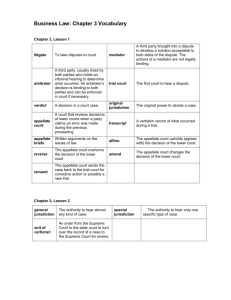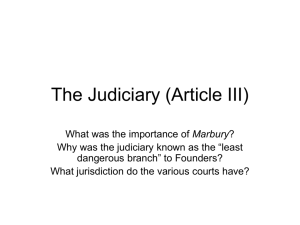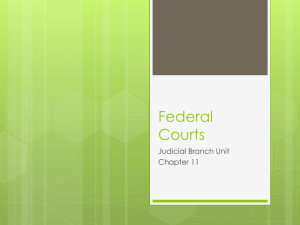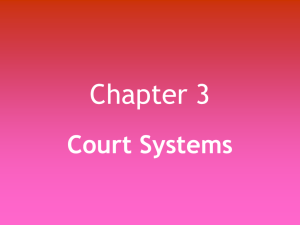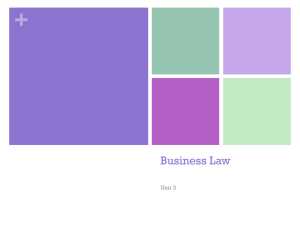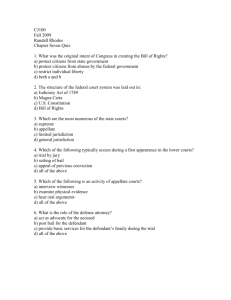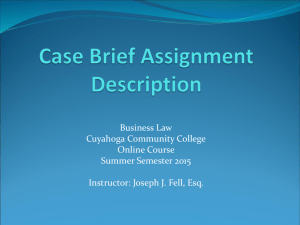Ch 2.1 PPT
advertisement
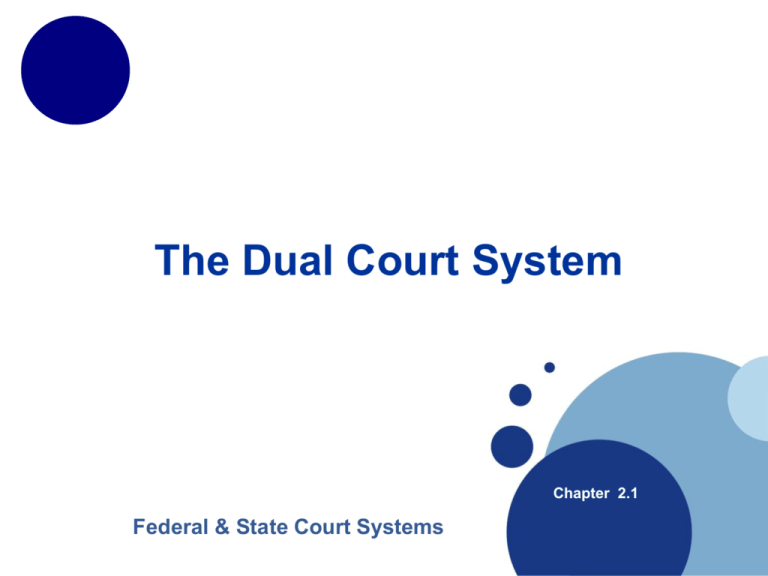
Company LOGO The Dual Court System Chapter 2.1 Federal & State Court Systems www.company.com Terms to Know Company LOGO • Chapter 2.1 • • www.company.com Jurisdiction - power & authority given to a court to hear a case and to make a judgement. Original Jurisdiction - power given to district courts to try a case before it goes to federal court. Appellate Jurisdiction - any party to a suit decided in a federal district court may appeal to the next highest court in the circuit where the case was tried. The Federal Court System Company LOGO • Chapter • 2.1 • Supreme Court - highest court Appellate Court - middle court; also called intermediate courts District Court - lowest court; where trials begin. There are 13 Circuits in the U.S. each with several District courts and 1 Appellate court www.company.com • All cases begin in the District Court. The Federal Court System Company LOGO • Supreme Court - highest court •Supreme Court has original jurisdiction in Chapter 2.1 www.company.com cases involving ambassadors, consuls, other public ministers and cases in which a state is a party. •Appellate jurisdiction is it’s main function. •Court must hear all cases involving the constitutionality of a federal law. •The Court decides by a vote of at least 4 of 9 judges which additional cases it will hear from the U.S. court of appeals or state supreme courts. The Federal Court System Company LOGO • Chapter 2.1 Appellate Court - middle court; also called intermediate courts •Only a question of law is raised. •If a case is appealed it goes to the appellate court. •There is no jury, witnesses or evidence presented in an appeal case. •Appellate courts only determine whether the lower court correctly applied the law in the circumstances. www.company.com The Federal Court System Company LOGO • Chapter 2.1 Special U.S. Courts •Congress has established several special federal courts. •They have special jurisdiction in certain kinds of cases. •Ex: Disagreements on imported good taxation •Ex: Cases involving citizens against the U.S. government •Ex: Disputes with the IRS www.company.com The State Court System Company LOGO • Chapter Each state can have its own court system but the following is a general pattern: 2.1 STATE COURT SYSTEM www.company.com •Supreme Courts •Intermediate Appellate Courts •Juvenile Courts •Domestic Relations Courts •Special Courts •General Trial Courts •Local Trial Courts The State Court System Company LOGO • Intermediate Appellate Courts •Hear cases of appeal from courts of Chapter general jurisdiction •Similar to U.S. Appellate Court 2.1 • State Supreme Courts • Cases can go on to U.S. Supreme Court •Similar to U.S. Supreme Court www.company.com The State Court System Company LOGO • • Chapter 2.1 Local Trial Courts Limited Jurisdiction - courts that have limited power •Handle minor matters •Misdemeanors •Civil actions involving small www.company.com amounts of $ •Petty crimes •Includes: •Traffic court •Police Court The State Court System Company LOGO • • Chapter 2.1 www.company.com General Trial Courts General Jurisdiction - courts that have general power and handle most cases •Also called: •County Court •Superior Court •Court of Common pleas •Circuit Court •Handle: •Criminal cases •Civil cases The State Court System Company LOGO • Chapter 2.1 Special State Courts •Domestic Relations Courts •Handle divorce, annulment and dissolution proceedings. •Handle distribution of property at the end of a marriage •Alimony & Child support www.company.com Company LOGO Chapter 2.1 The State Court System • Special State Courts •Juvenile Courts •Jurisdiction over delinquent, unruly, abused or neglected children up to a certain age. •Procedures are less formal •Juveniles do not have a right to trial by jury but proof beyond reasonable doubt must still exist to convict a juvenile. Delinquent child - a minor who has committed an adult crime. Unruly Child - a minor who has done something inappropriate (violate curfew). Neglected/Abusted Child - homeless, destitute or without adequate parental www.company.com care

